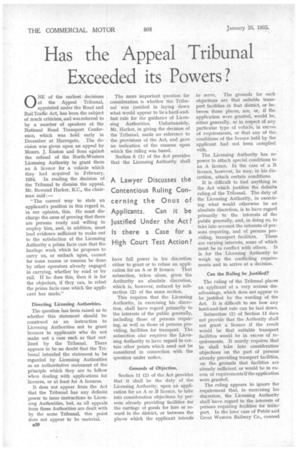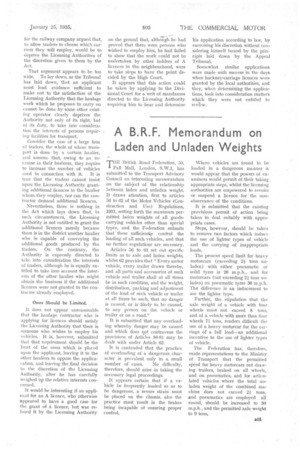Has the Appeal Tribunal Exceeded its Powers?
Page 48

Page 49

If you've noticed an error in this article please click here to report it so we can fix it.
0 NE of the earliest decisions of the Appeal Tribunal, appointed under the Road and Rail Traffic Act, has been the subject of much criticism, and was referred to by a number of speakers at the National Road Transport Conference, which was held early in December at Harrogate. The decision was given upon an appeal by Messrs. J. Enston and Sons against the refusal of the North-Western Licensing Authority to grant them an A licence for a vehicle which they had acquired in February, 1934. In reading the decision of the Tribunal to dismiqs the appeal, Mr. Rowand Harker, KC., the chairman said:—
" The correct way to state an applicant's position in this regard is, in our opinion, this. He must discharge the onus of proving that there are persons ready and willing to employ him, and, in addition, must lead evidence sufficient to make out to the satisfaction of the Licensing Authority a prima facie case that the haulage work which he proposes to carry on, or embark upon, cannot for some reason or reasons be done by other operators already engaged in carrying, whether by road or by rail. If he does this, then it is for the objectors, if they can, to rebut the prima facie case which the applicant has made."
Directing Licensing Authorities.
The question has been raised as to whether this statement should be construed as an instruction to Licensing Authorities not to grant licences to applicants who do not make out a case such as that outlined by the Tribunal. There appears to be no doubt that the Tribunal intended the statement to be regarded by Licensing Authorities as an authoritative statement of the principle which they are to follow when dealing with applications for licences, or at least for A licences.
It does not appear from the Act that the Tribunal has any definite power to issue instructions to Licensing Authorities, but, as all appeals from those Authorities are dealt with by the same Tribunal, this point does not appear to be material.
3330 The more important question for consideration is whether the Tribunal was justified in laying down what would appear to be a hard-andfast rule for the guidance of Licensing Authorities. Unfortunately, Mr. Harker, in giving the decision of the Tribunal, made no reference to the provisions of the Act, and gave no indication of the reasons upon which the ruling was based.
Section 6 (1) of the Act provides that the Licensing Authority shall have full power in his discretion either to grant or to refuse an application for an A or B licence. That subsection, taken alone, gives the Authority an absolute discretion, which is, however, reduced by subsection (2) of the same section.
This requires that the Licensing Authority, in exercising his discretion, shall have regard primarily to the interests of the public generally, including those of persons requiring, as well as those of persons providing, facilities for transport. The subsection also requires the Licensing Authority to have regard to certain other points which need not be considered in connection with the question under notice.
Grounds of Objection.
Section 11 (2) of the Act provides that it shall be the duty of the Licensing Authority, upon an application for an A or B licence, to take into consideration objections by persons already providing facilities for the carriage of goods for hire or reward in the district, or between the places which the applicant intends to serve. The grounds for such objections are that suitable transport facilities in that district, or between those places, are, or, if the application were granted, would be, either generally, or in respect of any particular type of vehicle, in excess of requirements, or that any of the conditions of the licence held by the applicant had not been complied with.
The Licensing Authority has no power to attach special conditions to an A licence. In the case of a B licence, however, he may, in his discretion, attach certain conditions.
It is difficult to find anything in the Act which justifies the definite ruling of the Tribunal. The duty of the Licensing Authority, in exercising what would otherwise be an absolute discretion, is to have regard primarily to the interests of the public generally, and, in doing so, to take into account the interests of persons requiring, and of persons pro viding, transport facilities. These are varying interests, some of which must be in conflict with others. It is for the Licensing Authority to weigh up the conflicting requirements and to arrive at a decision.
Can the Ruling be Justified?
The ruling of the Tribunal places an applicant at a very serious disadvantage, which does not appear to be justified by the wording of the Act. It is difficult to see how any hard-and-fast rule can be laid down.
Subsection (2) of Section 11 does not provide that the Authority shall not grant a licence if the result would be that suitable transport facilities would be in excess of requirements. It merely requires that he shall take into consideration objections on the part of persons already providing transport facilities, on the grounds that facilities are already sufficient, or would be in excess of requirements if the application were granted.
The ruling appears to ignore the requirement that, in exercising his discretion, the Licensing Authority shall have regard to the interests of persons requiring facilities for transport. In the later case of Petrie-and Great Western Railway Co., counsel
for the railway company argued that, to allow traders to choose which carriers they will employ, would be to deprive the Licensing Authorities of the discretion given to them by the Act.
That argument appears to be too wide. To lay down, as the Tribunal has laid down, that an applicant must lead evidence sufficient to make out to the satisfaction of the Licensing Authority that the haulage work which he proposes to carry on cannot be done by some other existing operator clearly deprives the Authority not only of its right, but of its duty, to take into consideration the interests of persons requiring facilities for transport.
Consider the case of a large firm of traders, the whole of whose transport is done by a certain haulier, and assume that, owing to an increase in their business, they require to increase the number of vehicles
used in connection with it. It is true that the traders cannot insist upon the Licensing Authority granting additional licences to the haulier whom they employ, nor can the contractor demand additional licences.
Nevertheless, there is nothing in the Act which lays down that, in such circumstances, the Licensing Authority is not entitled to grant the additional licences merely because there is in the district another haulier who is capable of conveying the additional goods produced by the traders. On the contrary, the Authority is expressly directed to take into consideration the interests of traders, although he is equally entitled to take into account the interests of the other haulier who might obtain the business if the additional licences were not granted to the contractor already employed.
Onus Should be Limited. • It does not appear unreasonable that the haulage contractor who is applying for licences should satisfy the Licensing Authority that there is someone who wishes to employ his vehicles. It is, however, submitted that that requirement should he the limit of the onus which is placed upon the applicant, leaving it to the other hauliers to oppose the applicacation, and leaving the final decision to the discretion of the Licensing Authority, after he has carefully weighed up the relative interests concerned.
It would be interesting if an applicant for an A licence, who otherwise appeared to have a good case for the grant of a licence, but was refused it by the Licensing Authority
on the ground that, although he had proved that there were persons who wished to employ him, he had failed to show that the work could not be undertaken by other holders of A licences in the neighbourhood, were to take steps to have the point decided by the High Court.
It appears that this action could be taken by applying to the Divisional Court for a writ of mandamus directed to the Licensing Authority requiring him to hear and determine his application according to law, by exercising his discretion without considering himself bound by the principle laid down by the Appeal Tribunal.
Somewhat similar applications were made with success in the days when hackney-carriage licences were granted by the local authorities, and they, when determining the applications, took into consideration matters which they were not entitled to review.




































































































